| Srl | Item |
| 1 |
ID:
166583
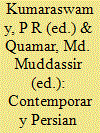

|
|
|
|
|
| Publication |
New Delhi, KW Publishers Pvt. Ltd., 2016.
|
| Description |
ix, 202p.: table, figureshbk
|
| Standard Number |
9789383649709
|
|
|
|
|
|
|
|
|
|
|
|
Copies: C:1/I:0,R:0,Q:0
Circulation
| Accession# | Call# | Current Location | Status | Policy | Location |
| 059681 | 327.53/KUM 059681 | Main | On Shelf | General | |
|
|
|
|
| 2 |
ID:
118981
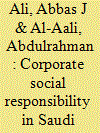

|
|
|
| 3 |
ID:
125028
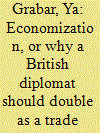

|
|
|
|
|
| Publication |
2013.
|
| Summary/Abstract |
FOREIGN POLICY cannot remain frozen; it is as fluid as any other sphere of social relations. Indeed, at different stages of human history, wars, national and religious movements, technical innovations, and scientific discoveries triggered changes in world politics. In the last five years, global economy gradually recovering from the world crisis which began in 2008 has been a catalyst of such changes. Economic problems which have not yet left the stage affected and continue to affect the UK foreign policy.
|
|
|
|
|
|
|
|
|
|
|
|
|
|
|
|
| 4 |
ID:
149845
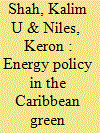

|
|
|
|
|
| Summary/Abstract |
Market integration efforts of Caribbean small island developing states have become transposed on the growing paradigm shift towards green economy pathways. Central to this is the challenge of implementing Caribbean energy policy in a manner that is aligned with green economy ideals and face the realities of regional indebtedness and environmental impacts. Here we analyze the current state of the Caribbean energy policy development arena and propose that the currently weak policy and institutional design regime might potentially benefit from the application of the Institutional Analysis and Design (IAD) model especially within the operational context of the green economy. It allows us to identify current policy dilemmas, bottlenecks and discrepancies and to disentangle some of them while offering up a way forward with others. We do not so much offer distinct recommendations but focus more on delineating how to clear the pathway for sound policy intervention and outcomes. By doing so we set forth a challenging agenda for future policy analysis research that will advance Caribbean energy policy in more robust ways.
|
|
|
|
|
|
|
|
|
|
|
|
|
|
|
|
| 5 |
ID:
142655
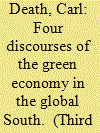

|
|
|
|
|
| Summary/Abstract |
This article identifies four contrasting global discourses of the green economy in contemporary usage: green resilience, green growth, green transformation and green revolution. These four discourses are manifested in recent green economy national strategies across the global South, including in Ethiopia, India, South Korea and Brazil. Disaggregating these discourses is politically important, and shows their different implications for broader political economies of the green state in the global South.
|
|
|
|
|
|
|
|
|
|
|
|
|
|
|
|
| 6 |
ID:
138233
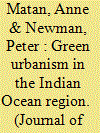

|
|
|
|
|
| Summary/Abstract |
The world is facing an ‘age of scarcity’ which will challenge all cities to reduce their resource footprint, especially carbon, improve biodiversity and at the same time continue to create economic opportunities and liveable places. This is green urbanism. These problems are being understood and cities are taking steps to resolve them. Around the world there are many emerging signs of green urbanism. This is a time for the Indian Ocean region, with its unprecedented urbanisation, to demonstrate to the world how to create a different kind of global economy that is more sustainable. Asia’s cities are predicted to be home to more than 60% of the world’s urban dwellers by 2050 and Africa will become even more dominant after that. The growth pressures in the region are clearly now dominating global urban demographics, but is the Indian Ocean region part of the solution or part of the problem? The first signs of the green economy are investigated through the theory of innovation waves and seven archetypal city types: renewable energy cities, bioregional carbon-neutral cities, distributed cities, biophilic cities, eco-efficient cities, place-based cities and sustainable transport cities. The first assessment of the contributions being made in the region shows considerable innovation happening in Asia. The opportunities for the region to lead the world in green urbanism are real.
|
|
|
|
|
|
|
|
|
|
|
|
|
|
|
|
| 7 |
ID:
138530
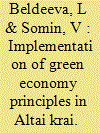

|
|
|
| 8 |
ID:
142662
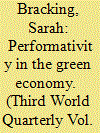

|
|
|
|
|
| Summary/Abstract |
This paper asks how far performativity in the Green Economy generates material or virtual assets. It examines the relationship between assets and their financial derivatives, asking how far the value of ‘carbon’ or ‘green’ can be directly attributed to its social and narrative construction. The paper draws on two case studies – one of the Clean Development Mechanism (CDM) in South Africa, the other of the global private green bonds market – to show that both public and private climate finance can generate virtual economic activity co-produced by processes of social valuation and accumulation proper. How reliant is the Green Economy on actual economic activity?
|
|
|
|
|
|
|
|
|
|
|
|
|
|
|
|
| 9 |
ID:
118243
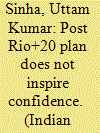

|
|
|
| 10 |
ID:
142659
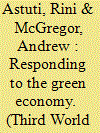

|
|
|
|
|
| Summary/Abstract |
This paper analyses the technologies of government that proponents of the Reducing Emissions from Deforestation and forest Degradation (REDD+) mechanism are adopting to influence forest governance in Indonesia. It analyses the aspects of forest governance being problematised; the solutions being constructed; and who is influencing the production and content of these solutions. The research focuses on three aspects of the One Map Initiative: the forest moratorium; forest licensing; and new standards in participative mapping. Our findings show that the initiative has created new opportunities and constraints for forest reform. New disciplinary and participatory technologies have emerged that have created political spaces for activists to actively promote social and environmental justice concerns. However, our analysis also shows tensions for forest stakeholders between engaging in the new opportunities of the green economy and the risk of having political issues rendered technical.
|
|
|
|
|
|
|
|
|
|
|
|
|
|
|
|
| 11 |
ID:
118244
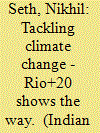

|
|
|
| 12 |
ID:
088003


|
|
|
|
|
| Publication |
2009.
|
| Summary/Abstract |
Going green has finally gone mainstream, and politicians from London to Seoul are spending billions on clean technologies they say will create jobs. But unless we are all willing to risk a little more pain, the green revolution could founder before it ever really starts.
|
|
|
|
|
|
|
|
|
|
|
|
|
|
|
|
| 13 |
ID:
088008
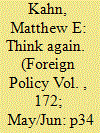

|
|
|
|
|
| Publication |
2009.
|
| Summary/Abstract |
No way. Vowing to pump $150 billion into green technology over the next decade, U.S. President Barack Obama has made big promises about his environmental agenda. "It will also help us transform our industries and steer our country out of this economic crisis by generating 5 million new green jobs that pay well and can't be outsourced," he said in November.
British Prime Minister Gordon Brown has similarly called for an international "Green New Deal" to create a "low-carbon recovery." The United Nations wants a full 1 percent of global GDP to go to environmental initiatives. Rich countries such as Canada, Japan, and South Korea are obliging, spending billions to promote ecofriendly projects and green businesses.
|
|
|
|
|
|
|
|
|
|
|
|
|
|
|
|
| 14 |
ID:
142656
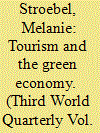

|
|
|
|
|
| Summary/Abstract |
This paper investigates how tourism stakeholders conceptualise tourism in a green economy and how they foresee the transition to progress. With the meaning of a green economy remaining contested, the political agenda that the concept entails in a particular context can be far from clear. The paper provides a qualitative analysis of Towards a Green Economy and the publication Green Growth and Travelism to explore the implementation strategies and political agendas of tourism stakeholders. It outlines how stakeholders argue in line with international organisations that tourism can contribute to growth, development and poverty alleviation, while reducing environmental impacts. However, some researchers challenge the foundations of the green growth discourse. An exploration of these contradictions and of the political and economic implications of climate change leads the paper to argue that the particular framing of the green economy presents tourism in a way that sets the industry up for continued growth, while marginalising a much-needed radical transformation.
|
|
|
|
|
|
|
|
|
|
|
|
|
|
|
|
| 15 |
ID:
120156


|
|
|
|
|
| Publication |
Singapore, KAS, 2012.
|
| Description |
xiii,175p.pbk
|
| Standard Number |
9789810717995
|
|
|
|
|
|
|
|
|
|
|
|
Copies: C:1/I:0,R:0,Q:0
Circulation
| Accession# | Call# | Current Location | Status | Policy | Location |
| 057238 | 333.79/HEZ 057238 | Main | On Shelf | General | |
|
|
|
|
| 16 |
ID:
144843
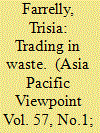

|
|
|
|
|
| Summary/Abstract |
This paper provides a broad survey of existing literature on contemporary solid waste management (SWM) in the Pacific region to underscore an urgent and compelling need for improved SWM. Despite advances in waste management systems and funding for technical support and capacity building from a range of sources, waste continues to threaten public and ecological health and the economy in Pacific Islands Countries and Territories (PICTs). SWM in the Pacific requires innovative thinking in a challenging environment of remoteness, limited available land, fragile ecosystems, vulnerability to natural hazards and subsequent climate sensitivity. Many PICTs are under considerable pressure to open their markets up to trade liberalisation. Increasing links to the global economy through trade liberalisation could either further exacerbate waste management challenges in the Pacific or contribute to environmental protection and sustainable development goals. The authors argue that if the PICTs' urgent waste management challenges are to be meaningfully addressed, the region's leaders must ensure trading partners conform to local environmental protection policies and that trade agreements align with sustainable development goals.
|
|
|
|
|
|
|
|
|
|
|
|
|
|
|
|